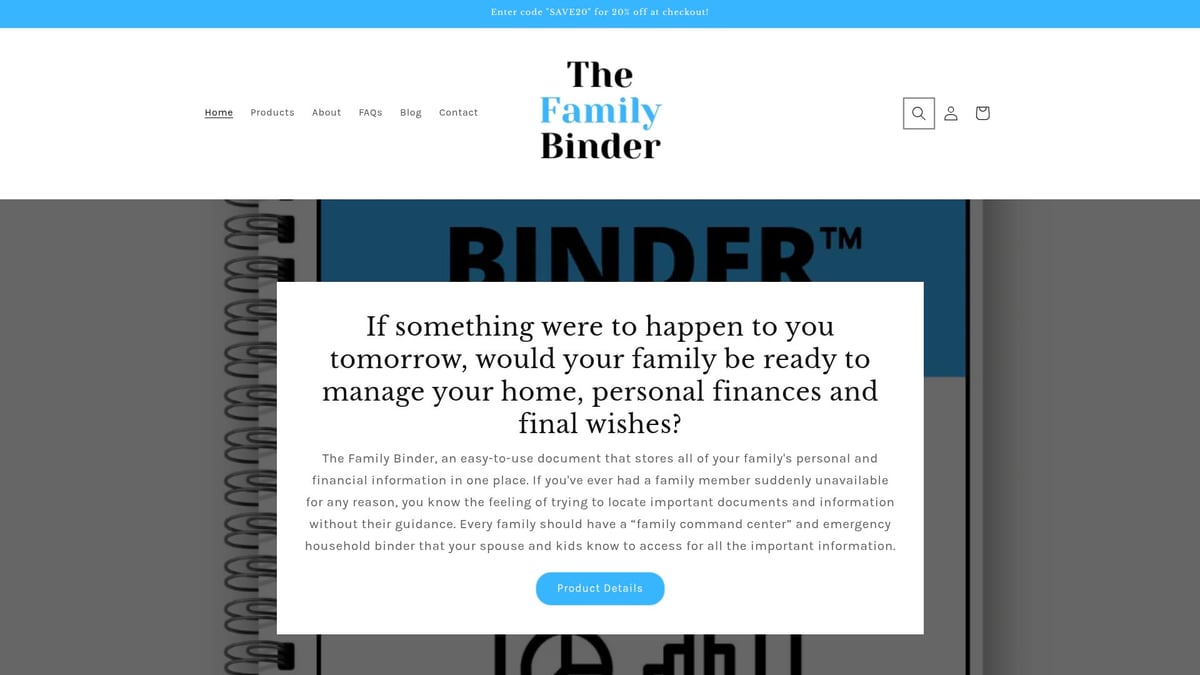Imagine your family facing a crisis. Would your wishes, assets, and vital information be easily found and clearly understood? With the rules around inheritance and digital assets changing quickly in 2025, having a family estate planner is more important than ever.
Proper estate planning offers peace of mind, protects your loved ones, and secures your legacy. This guide will show you how to take control of your future step by step.
Inside, you'll learn the basics, the planning process, legal must-haves, how to manage digital assets, and the best tools for staying organized. Let’s get started on building your family’s security.
Understanding Family Estate Planning in 2025
Family estate planning has transformed in recent years, reflecting the evolving needs of modern households. No longer reserved for the wealthy, a family estate planner helps ensure your wishes, assets, and loved ones are protected. Let’s explore what this means and why it’s never been more essential.

What is Family Estate Planning?
A family estate planner is a comprehensive approach to organizing and managing your assets, wishes, and loved ones’ futures. It covers everything from writing wills and creating trusts to setting up powers of attorney and healthcare directives.
For today’s families, estate planning means considering unique situations, such as blended families or caring for aging parents. Central components include:
- Wills to outline asset distribution
- Trusts for managing wealth and protecting beneficiaries
- Powers of attorney for financial and healthcare decisions
- Advance directives for medical care
Consider a family that used a family estate planner to document their wishes. When a crisis struck, clear instructions prevented disputes, ensuring a smooth transition for everyone.
Why Estate Planning is More Critical Than Ever in 2025
In 2025, the need for a family estate planner is rising due to shifting family structures, an explosion of digital assets, and new legal regulations. Blended families, cohabitating partners, and multi-generational households require more tailored plans.
With more online accounts and cryptocurrencies, families must secure digital legacies. Legal and tax changes also impact how assets are passed on. According to Estate Planning Statistics 2025, over 60% of Americans lack an up-to-date estate plan, leaving families vulnerable.
A family estate planner now includes digital assets and must keep pace with changing laws to protect your loved ones.
Common Misconceptions and Pitfalls
Many people think a family estate planner is only for the wealthy, but this is a myth. Overlooking digital assets or personal items, such as photos and heirlooms, is a common mistake.
DIY estate planning might seem easy, but it can lead to costly errors. For example, several celebrities’ estates have faced lengthy court battles because their plans were incomplete or unclear.
Using a family estate planner and seeking professional guidance helps avoid these pitfalls and secures your family’s future.
Key Benefits for Families
A well-crafted family estate planner offers peace of mind and practical benefits. It helps families:
- Avoid probate and lengthy legal battles
- Protect minor children and dependents
- Minimize estate taxes and preserve family wealth
- Ensure healthcare wishes are honored
By using a family estate planner, you give your loved ones clarity, security, and a lasting legacy.
The Cost of Not Planning
Without a family estate planner, families can face emotional, financial, and legal turmoil. Probate often consumes 3–7% of an estate’s value and can take years to settle.
A proactive approach with a family estate planner saves time, money, and stress, ensuring your family’s well-being when it matters most.
Step-by-Step Family Estate Planning Process for 2025
Building a robust family estate planner is a journey, not a one-time event. By following a clear, step-by-step process, you can take control and ensure your loved ones are protected, no matter what the future holds. Whether you are just starting out or updating an existing plan, these essential steps will help you create a comprehensive strategy for 2025 and beyond.

Step 1: Assess Your Family’s Needs and Goals
Start your family estate planner journey by identifying everyone who should be included in your plan. List all family members, dependents, and anyone with special circumstances, such as elderly parents, minor children, or relatives with disabilities.
Set clear priorities. Decide what matters most, whether it is inheritance, guardianship, or charitable giving. For example, if you have a child with special needs, planning for long-term care and financial security is crucial.
A comprehensive estate planning guide can help you navigate these questions and set a strong foundation.
Step 2: Inventory All Assets and Liabilities
A well-prepared family estate planner must include a thorough inventory of all assets and debts. Start by listing:
- Bank and investment accounts
- Real estate
- Vehicles and valuable personal property
- Life insurance and retirement accounts
Do not forget digital assets like cryptocurrencies, online accounts, and social media profiles. Use templates or digital tools to organize this information efficiently.
Keeping this inventory updated ensures your family can easily locate and manage everything when needed.
Step 3: Choose Key Decision Makers
Selecting the right people to carry out your family estate planner is critical. Assign roles such as:
- Executor (manages your will)
- Trustee (oversees trusts)
- Guardian (for minor children)
- Agents (for financial and healthcare power of attorney)
Look for individuals who are trustworthy, organized, and willing to take on responsibility. Always name backup choices in case your first pick is unable to serve.
Documenting these decisions clearly helps prevent confusion and conflict later on.
Step 4: Draft Essential Legal Documents
A complete family estate planner should include vital legal documents to protect your wishes. Key documents are:
- Will: Outlines asset distribution and guardianship for children.
- Trusts: Consider revocable, irrevocable, or special needs trusts to manage assets and avoid probate.
- Powers of Attorney (POA): Assigns someone to handle finances or healthcare if you are incapacitated.
- Advance Healthcare Directive/Living Will: States your medical preferences.
For example, creating a living trust can help blended families avoid probate and ensure everyone is provided for. Consult an attorney to tailor documents to your unique situation and comply with 2025 law changes.
Step 5: Address Digital Assets and Online Presence
Your family estate planner should not overlook digital life. Make a secure list of:
- Logins for email, cloud storage, and financial apps
- Social media accounts
- Cryptocurrencies and NFTs
Appoint a digital executor to manage or close online accounts. Check legal requirements for digital assets, and keep access instructions up to date.
Proper planning here prevents lost assets and protects your family’s online reputation.
Step 6: Communicate and Share Your Plan
Transparency is key to a successful family estate planner. Hold a family meeting to explain your decisions and each person’s role. This helps avoid misunderstandings and reduces the risk of disputes.
Share important documents and passwords securely, using encrypted email or a trusted password manager. Let your executor, trustee, and key family members know where to find everything.
Open communication ensures your wishes are understood and respected.
Step 7: Review, Update, and Maintain Your Plan
Life changes—so should your family estate planner. Regularly review your documents after major events like marriages, births, deaths, or significant purchases.
Schedule annual check-ins to ensure all information stays current and accessible. A proactive approach keeps your plan effective and your family protected.
Legal Must-Haves and Compliance in 2025
Estate planning laws are evolving fast, and a modern family estate planner must keep up with the latest changes. Staying compliant in 2025 means understanding both new regulations and the practical tools you need to keep your family's future secure. Let’s break down what every family needs to know to stay ahead.

Understanding 2025 Estate Law Changes
In 2025, several federal and state estate laws are changing, so it’s crucial for every family estate planner to stay informed. Updates include shifts in estate and gift tax exemptions, which may affect how much wealth you can transfer tax-free.
States are also adding new requirements for digital asset inclusion in estate plans. This means you’ll need to consider online accounts and digital currencies alongside traditional assets. Staying current with these laws helps avoid costly mistakes and ensures your plan remains valid.
Essential Documents Every Family Needs
Every comprehensive family estate planner should include a core set of legal documents. These typically are:
- Will
- Trust (revocable or irrevocable)
- Power of attorney (financial and healthcare)
- Advance healthcare directive
- Beneficiary designations on retirement and insurance accounts
- Letter of intent for personal wishes
For a more detailed breakdown, see the Top 10 Essential Documents every family should have ready. Keeping these up to date ensures your wishes are honored and your loved ones are protected.
Working with Estate Planning Attorneys and Professionals
A family estate planner often benefits from expert guidance. While some online tools can help, an attorney ensures your documents comply with current laws and fit your unique circumstances.
Look for professionals with experience in family estate planning. Ask about their background, approach, and how they stay updated on changing laws. Many costly mistakes, like outdated beneficiary forms or unclear trusts, are avoided with professional support.
Avoiding Probate and Reducing Estate Taxes
Probate can be lengthy and expensive, but a proactive family estate planner can help your family bypass many hurdles. Strategies include:
- Joint ownership of assets
- Payable-on-death accounts
- Gifting during your lifetime
Using trusts can cut probate costs by up to 50 percent. Minimizing estate taxes preserves more of your wealth for future generations. The right plan brings peace of mind and financial security.
Protecting Vulnerable Family Members
A thorough family estate planner considers the needs of every loved one. Special needs trusts safeguard benefits for disabled children or adults. Guardianship arrangements ensure minors are cared for by trusted individuals.
For elderly parents or multi-generational households, planning can include healthcare directives and power of attorney. These steps keep vulnerable family members protected, even in unexpected situations.
Organizing and Storing Your Estate Plan
Getting your estate documents organized is one of the most important steps in any family estate planner’s journey. Without a clear system, even the best-laid plans can be hard for loved ones to find or use when it matters most.
Best Practices for Document Organization
A successful family estate planner makes sure every document is easy to find and up to date. Start by creating a master file that includes all your key paperwork, such as wills, trusts, and powers of attorney.
Store copies in both paper and digital formats. Use a secure cloud storage service and a reliable password manager to protect sensitive files. Clearly label each folder, and keep an updated inventory so nothing gets overlooked.
Regularly review and update your files. Set reminders to revisit your estate plan every year or after major life changes. This habit keeps your family estate planner current and relevant.
Checklist for organizing:
- Master file (paper and digital)
- Secure cloud storage
- Password-protected access
- Clear labeling
- Annual updates
An organized system prevents confusion and ensures your wishes are honored.
Who Should Have Access and How to Share
Deciding who gets access to your family estate planner is just as crucial as the documents themselves. At minimum, your chosen executor, trusted family members, and professional advisors should know where to find these records.
Share copies using secure methods like encrypted email or a physical safe. Avoid common pitfalls by keeping a list of who has access and updating it when roles change.
Tips for sharing:
- Give key people clear instructions and access codes
- Use secure digital sharing tools
- Store backup copies offsite
For example, one family avoided a crisis during an emergency simply because their family estate planner was stored in both a fireproof safe and a cloud folder accessible to their executor. This simple step saved time and stress.
The Family Binder: The Complete Family Estate Planning Organizer
Looking for a comprehensive solution? The Family Binder is a powerful tool for any family estate planner. This organizer offers over 70 editable pages covering everything from financial accounts and home inventory to digital logins and insurance details.

With The Family Binder, you get peace of mind knowing updates are simple, and your loved ones can easily locate vital information. Many families say it complements their legal documents and makes ongoing plan maintenance a breeze.
Want to see how it works in real life? Read how Simplifies Estate Planning for Families has helped others streamline their estate plans.
A testimonial from one user shares, “Having all our documents in The Family Binder meant our family estate planner was always ready, no matter what life threw at us.” This tool keeps your plan organized and accessible for years to come.
Managing Digital Assets and Online Legacies
In today’s digital world, your family estate planner must go beyond traditional assets. From online bank accounts to treasured family photos, managing your digital legacy is now a crucial part of protecting your wishes and your family’s future. Let’s explore how to organize, secure, and pass on your digital life as part of a comprehensive family estate planner.
Cataloging and Securing Digital Assets
Begin your family estate planner by making a thorough inventory of all digital assets. This includes online banking, investment accounts, emails, cloud storage, social media, and cryptocurrencies. List account names, URLs, and what each holds in value or significance.
- Financial accounts (banking, PayPal, crypto wallets)
- Cloud storage (Google Drive, Dropbox)
- Social media (Facebook, Instagram, X)
- Subscriptions and digital files
Use secure password managers to store login details, and consider encryption for sensitive information. For a deeper dive on organizing digital assets, check out Digital Estate Planning Essentials. A family estate planner that includes digital assets ensures nothing is lost or forgotten.
Appointing a Digital Executor
A modern family estate planner should name a digital executor, a trusted person who will manage your digital presence after you’re gone. This role is different from your regular executor and focuses on your online accounts and digital files.
What should your digital executor do?
- Access and close online accounts as needed
- Transfer digital assets to heirs
- Securely erase sensitive data to prevent misuse
Make sure your family estate planner gives clear, legal authorization for your digital executor to act. Some platforms require special forms or access codes, so preparing these in advance is essential for a seamless transition.
Social Media, Photos, and Online Memories
Social media and online photo libraries have become the new family albums. Integrate instructions into your family estate planner for preserving or deleting online memories.
Decide which accounts should be memorialized, deleted, or transferred. Most platforms, like Facebook and Google, offer options to designate legacy contacts. Organize cloud-stored photos and videos, and leave clear instructions for your digital executor to handle these assets.
A family estate planner with detailed guidance ensures your family can cherish memories or protect privacy, as you wish.
Protecting Against Digital Fraud and Identity Theft
After incapacity or death, digital accounts are vulnerable to fraud and theft. A robust family estate planner includes steps to guard against these risks.
- Use strong, unique passwords for every account
- Enable two-factor authentication where possible
- Regularly update and audit your digital asset inventory
Notify your digital executor and family members about these precautions. According to the FTC, digital estate fraud rose by 30% in 2023, making proactive planning more important than ever. With a diligent family estate planner, you can shield your legacy from digital threats.
Estate Planning for Modern Family Dynamics
Modern families are wonderfully diverse, and your family estate planner must keep pace. Whether your household includes stepchildren, second marriages, close friends, or beloved pets, a flexible approach is essential. Let’s explore how to ensure your plan fits every member of your unique family.
Planning for Blended Families and Stepchildren
Blended families often face unique challenges when it comes to estate planning. A family estate planner should ensure that both biological and stepchildren are treated according to your wishes. Without careful planning, state laws might unintentionally leave out stepchildren or favor certain heirs.
To avoid accidental disinheritance, consider custom trust solutions that clearly outline asset distribution. Regularly update beneficiary designations on retirement accounts and insurance policies to reflect your current family structure. Schedule open conversations with all family members so everyone understands your intentions. By tailoring your family estate planner to your blended family’s needs, you reduce the risk of disputes and promote lasting harmony.
Addressing Second Marriages and Prenuptial Agreements
Second marriages bring both joy and complexity. Your family estate planner should coordinate with any prenuptial or postnuptial agreements to protect the interests of all parties. This is especially important if there are children from previous relationships who need safeguarding.
Legal trends in 2025, such as updated spousal rights and inheritance laws, make it even more vital to work with a professional. For insights into these changes, see Estate Planning Law Trends 2025. Consider trusts that provide for your new spouse while ensuring assets eventually reach your children. Clear documentation prevents confusion and ensures everyone’s rights are honored. Your family estate planner is your best tool for balancing the needs of blended households.
Including Non-Traditional and Chosen Family Members
Families are not always defined by blood or marriage. Your family estate planner can recognize unmarried partners, close friends, or caregivers who play a significant role in your life. Unfortunately, many people overlook these relationships, leading to unintentional exclusion.
To bridge the gap between awareness and action, Estate Planning Awareness and Education highlights the importance of proactive planning. Name trusted individuals in your will, trust, or healthcare directive to ensure their involvement. For example, you might designate a close friend as your healthcare proxy or leave specific assets to a longtime caregiver. Customizing your family estate planner guarantees your wishes are respected, regardless of legal definitions.
Planning for Pets and Dependent Animals
Pets are cherished family members, and a family estate planner should make provisions for their care. In 2024, 67% of U.S. households have pets, yet many plans overlook their needs. Creating a pet trust allows you to set aside funds and appoint a guardian who will love and care for your animals.
Include detailed instructions for daily routines, medical needs, and favorite activities in your family estate planner. Discuss your choices with potential caregivers and review plans regularly to keep everything up to date. By including pets in your family estate planner, you provide peace of mind that all loved ones, furry or otherwise, are protected.
Estate Planning Tools, Resources, and Next Steps
The right tools and resources can make your family estate planner journey easier and more effective. As estate planning becomes more digital and user-friendly, you have more options than ever to organize, protect, and update your family’s legacy.
Digital Tools and Templates for Estate Planning
Modern estate planning offers a range of digital solutions to help you create and update your family estate planner. Leading apps and platforms provide templates for wills, trusts, and asset inventories. Many allow you to track accounts, share access securely, and set reminders for updates.
Popular choices include online will makers, cloud-based document organizers, and password managers. These tools offer convenience and reduce paperwork. However, DIY options may miss legal nuances, so weigh the benefits of professional guidance. Many families find that digital checklists streamline the process and reduce errors.
If you are curious about how the industry is evolving and why digital tools are gaining traction, review the latest Estate Planning Industry Market Data for trends and insights.
Educational Resources and Support Networks
A well-informed family estate planner uses trusted resources to stay updated. Reliable websites, such as government estate planning portals and nonprofit organizations, offer free guides, checklists, and webinars. These resources help you understand legal terms and steps.
Support groups for caregivers and executors are also invaluable. They offer advice, share experiences, and provide emotional support during challenging times. Connecting with others in similar situations can make complex decisions easier to manage.
Bookmark educational sites and join local or online communities to strengthen your estate planning network.
Staying Proactive: Annual Reviews and Life Event Updates
A successful family estate planner is never static. Set annual reminders to review your plan and adjust whenever life changes—marriage, divorce, births, deaths, or major purchases. These events can affect your wishes and beneficiaries.
Keep all records current and accessible. Use digital calendars or reminder apps to prompt regular check-ins. This habit ensures your estate plan always reflects your family’s needs and avoids complications down the road.
Staying proactive gives you confidence that your efforts today will protect your loved ones tomorrow.
If you want true peace of mind knowing your family will have everything they need at their fingertips, it’s time to put what you’ve learned into action. We’ve talked about how estate planning isn’t just for the wealthy—it’s about protecting your loved ones, organizing your digital life, and making sure your wishes are clear. You don’t have to start from scratch or worry about missing something important. With The Family Binder, you can organize every detail in one place and make updates as your life changes. Ready to take the next step toward security and clarity? Download Now

